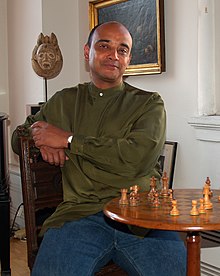Anthony Appiah
Kwame Anthony Akroma-Ampim Kusi Appiah (born May 8, 1954 in London ) is an analytical philosopher who, among other things, works on questions of semantics , ethics , politics and intercultural philosophy and writes novels in addition to extensive editorial work. He is a professor at New York University .
Life
Appiah was born in London as the son of the well-known Ghanaian politician and lawyer Joe Appiah and Peggy Cripps-Appiah, who was born in Great Britain and made famous in Ghana for her children's books . He spent his childhood in Kumasi , Ghana .
Appiah studied from 1972 to 1982 at Clare College in Cambridge and earned his doctorate there ( Ph.D. ). He then worked at Yale from 1982 to 1986 , Cornell from 1986 to 1990 and then Duke from 1990 to 1991 . From 1991 to 2002 he was at Harvard . In 2002 Appiah was appointed Laurance S. Rockefeller Professor at Princeton and in 2014 he moved to New York University .
In 1995 Appiah was elected to the American Academy of Arts and Sciences . In 2001 he became an elected member of the American Philosophical Society .
He is best known for his concept of cosmopolitanism as the primacy of universality ( human rights values ) over difference ( among cultures ). Race and identity play a central role in his politically liberal thinking.
Works (incomplete)
- In My Father's House. Africa in the Philosophy of Culture. Methuen, London 1992, ISBN 0-413-67600-5 .
- Cosmopolitan patriotism (= Edition Suhrkamp. 2230). Suhrkamp , Frankfurt am Main 2001, ISBN 3-518-12230-4 .
- Thinking it through. An Introduction to Contemporary Philosophy. Oxford University Press , Oxford et al. 2003, ISBN 0-19-516028-2 (revision of An Introduction to Philosophy , 1989).
- The ethics of identity. Princeton University Press , Princeton NJ et al. 2005, ISBN 0-691-12036-6 .
-
Cosmopolitanism (2006)
- The cosmopolitan. Philosophy of Cosmopolitanism. CH Beck , Munich 2007, ISBN 978-3-406-56327-0 .
-
Experiments in ethics (2008)
- Ethical experiments. Exercises for the good life. CH Beck, Munich 2009, ISBN 978-3-406-59264-5 .
-
The Honor Code: How Moral Revolutions Happen (2010)
- A question of honor or how moral revolutions come about. CH Beck, Munich 2011, ISBN 978-3-406-61488-0 .
- Lines of Descent: WEB Du Bois and the Emergence of Identity. Harvard University Press , Cambridge, Massachusetts 2014.
-
The Lies That Bind: Rethinking Identity , Profile Books, 2018, ISBN 978-1781259238 .
- Identities - the fictions of belonging , translated from English by Michael Bischof, Hanser Berlin, 2019, 336 pp., ISBN 978-3-446-26416-8 .
Web links
- Literature by and about Anthony Appiah in the catalog of the German National Library
- Stanford Presidential Lecturers in the Humanities and Arts
- Anthony Appiah's personal homepage
- bibliography
- "Philosophy of World Citizenship": "The Cosmopolitan". Reading sample from Perlentaucher
- Anniversary speech "The Life of Honor" as part of the 600th anniversary of the University of Leipzig
Individual evidence
- ^ Member History: Kwame Anthony Appiah. American Philosophical Society, accessed April 12, 2018 (with a short biography).
- ↑ Kwame Anthony Appiah: “Identities” “There was never a uniform culture” , deutschlandfunkkultur.de of September 21, 2019, accessed on the same date
| personal data | |
|---|---|
| SURNAME | Appiah, Anthony |
| ALTERNATIVE NAMES | Appiah, Kwame Anthony Akroma-Ampim Kusi |
| BRIEF DESCRIPTION | American analytical philosopher and writer |
| DATE OF BIRTH | May 8, 1954 |
| PLACE OF BIRTH | London |
